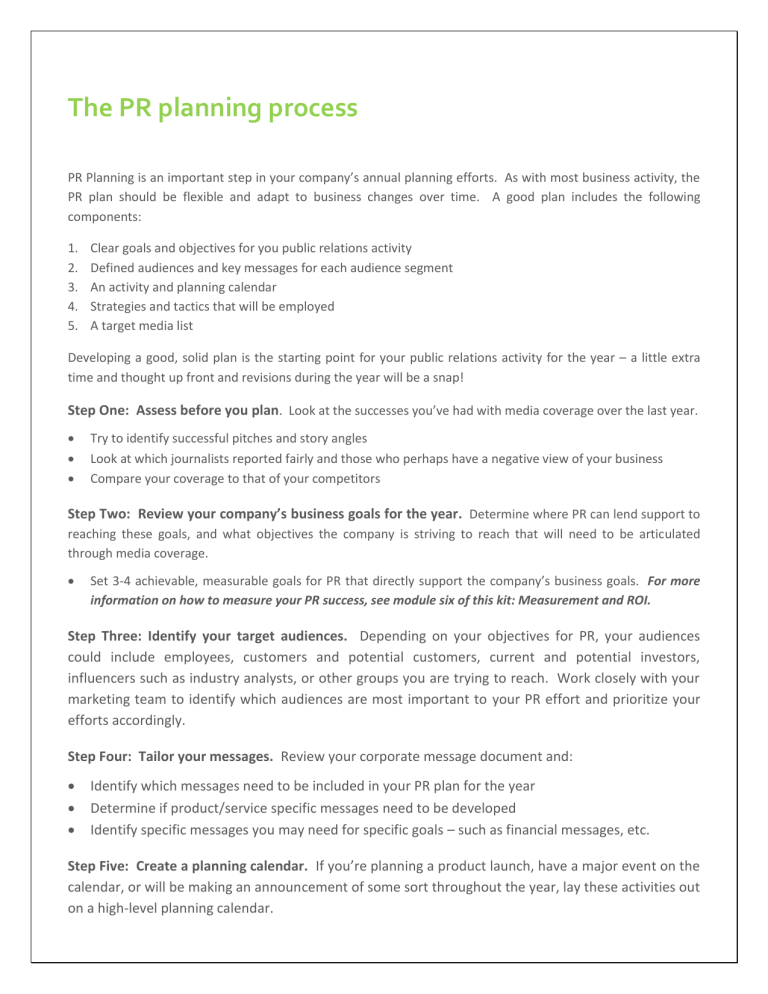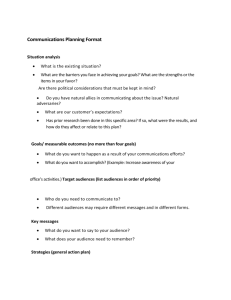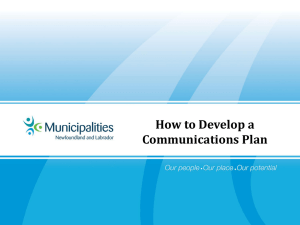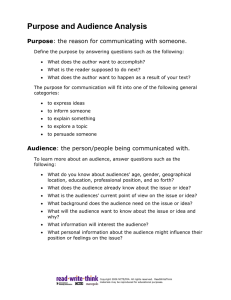
The PR planning process PR Planning is an important step in your company’s annual planning efforts. As with most business activity, the PR plan should be flexible and adapt to business changes over time. A good plan includes the following components: 1. 2. 3. 4. 5. Clear goals and objectives for you public relations activity Defined audiences and key messages for each audience segment An activity and planning calendar Strategies and tactics that will be employed A target media list Developing a good, solid plan is the starting point for your public relations activity for the year – a little extra time and thought up front and revisions during the year will be a snap! Step One: Assess before you plan. Look at the successes you’ve had with media coverage over the last year. Try to identify successful pitches and story angles Look at which journalists reported fairly and those who perhaps have a negative view of your business Compare your coverage to that of your competitors Step Two: Review your company’s business goals for the year. Determine where PR can lend support to reaching these goals, and what objectives the company is striving to reach that will need to be articulated through media coverage. Set 3-4 achievable, measurable goals for PR that directly support the company’s business goals. For more information on how to measure your PR success, see module six of this kit: Measurement and ROI. Step Three: Identify your target audiences. Depending on your objectives for PR, your audiences could include employees, customers and potential customers, current and potential investors, influencers such as industry analysts, or other groups you are trying to reach. Work closely with your marketing team to identify which audiences are most important to your PR effort and prioritize your efforts accordingly. Step Four: Tailor your messages. Review your corporate message document and: Identify which messages need to be included in your PR plan for the year Determine if product/service specific messages need to be developed Identify specific messages you may need for specific goals – such as financial messages, etc. Step Five: Create a planning calendar. If you’re planning a product launch, have a major event on the calendar, or will be making an announcement of some sort throughout the year, lay these activities out on a high-level planning calendar. Ensure that you have a balance of activity throughout the year so that you aren’t overly weighted in one month or quarter with nothing else later on If possible, time your announcements to get the most buzz Look for gaps in the calendar where you will have to proactively “make” coverage happen Review key publications that you want to target for coverage and add selected editorial calendar opportunities to each quarter Step Six: Lay out your strategies and tactical plan. Determine the best strategies to use to meet your goals – these are the approaches you will take and they will help focus your resources. Then identify the key tactics that you will use to reach your audiences. There are many tactics you can use, for example: Setting up introductory meetings with key analysts and reporters to begin developing a relationship Identifying events that reach your audiences that you want to attend or participate in Developing a speakers program to highlight key executives Writing by-lined articles for placement in target publications Step Seven: Create a targeted media list. Your media list should include: Local reporters who cover your industry Trade publications popular with your customers Key national publications that reach your customer audience Blogs and online sources who cover your industry or reach your customer audience Industry analysts who cover your industry and competitors The list can be in a simple excel worksheet or a database, but you will want key details on each reporter and publication including: Contact details and preferred method of contact (some reporters prefer email to phone) Publication cycle (daily, weekly, monthly, etc.) Ranking in terms of importance to your customers (tier by A, B and C publications) Coverage history (how often has this reporter covered you) Summary of PR Plan components: Plan overview Objectives and goals Strategies and tactics Key messages Dependencies and timeline Resources High level calendar Deliverables list



